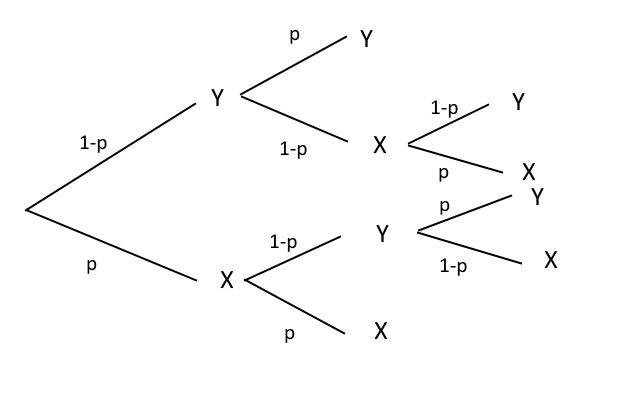Xavier and Younis (pretty weird names) are playing a match. The match consists of a series of games and each game consists of three points. Xavier has probability p and Younis has probability 1-p of winning the first point of any game. In the second and third points of each game, the player who won the previous point has probability p and the player who lost the previous point has probability 1-p of winning the point. If a player wins two consecutive points in a single game, the match ends and that player has won; otherwise,the match continues with another game.
a) Let w be the probability that Younis wins the match. Show that for p different than 0, $$w=\frac {1-p^2}{2-p}$$. Show that \(w>1/2\) if \(p<1/2\), and \(w<1/2\) if \(p>1/2\). Does w increase whenever p decreases?
This is the longest part of the problem. Let us analyze what happens during each game through a probability tree.

In the image above, Y stands for Younis winning a point and X stands for Xavier winning a point. It is easy to say that the probability of Younis winning is $$p-p^2+p(p-p^2)=p-p^3$$. The probability of neither winning nor losing is $$(1-p)^3+p(1-p)^2=(1-p)^2$$.
The probability of Younis winning the first game is the probability above, \(p-p^3\). For Younis to win in the second match, the first match must conclude in a draw, and, thus, the probability of Younis winning in the second match \((1-p)^2 (p-p^3)\). Thus, the probability of Younis winning is an infinite sum: $$w=(p-p^3)\sum_{n=1}^{\infty}(1-p)^{2n}=\frac {1-p^2}{2-p}$$
By differentiating in rapport to p, \(\frac {dw}{dp} = \frac {p^2-4p+1}{(2-p)^2}\), which is bigger than 0 if \(p^2-4p+1>0\), which happens if p isn't in the interval between \(2-3^{1/2}\)and \(2+3^{1/2}\). Since the first fraction is smaller than 0.5 and the latter is bigger than 0.5, it means that \(w\)is decreasing in 0.5, and \(w(0.5)=0.5\), so the conclusion of the problem holds.
b) If Xavier wins the match, Younis gives him 1 pound; if Younis wins the match, Xavier gives him k pounds. Find the value of k for which the game is 'fair' in the case when p=2/3.
It is easy to say that Younis' expected profit is \(w\) pounds, while Xavier's expected profit is \((1-w)k\). $$w(2/3)=\frac {5}{12}, (1-w)k=\frac {7}{12}k=\frac {5}{12}$$, so \(k=\frac {5}{7}\)pounds.
c) What happens if \(p=0\)?
If \(p=0\), then Younis will win the first and last points in each game, and Xavier will win the second point; thus, the game never ends, as no one will win two consecutive games.
It is pretty hard to come across elementary Probability problems, even in undergraduate exam papers. I pretty much enjoy this type of problems, as it challenges the student to think about a (more or less) real situation and apply probability in it. This problem was rather easy, yet it was pretty fun to solve, at least for me. Tune in next time for who-knows-what type of problem.
Cris.
No comments:
Post a Comment